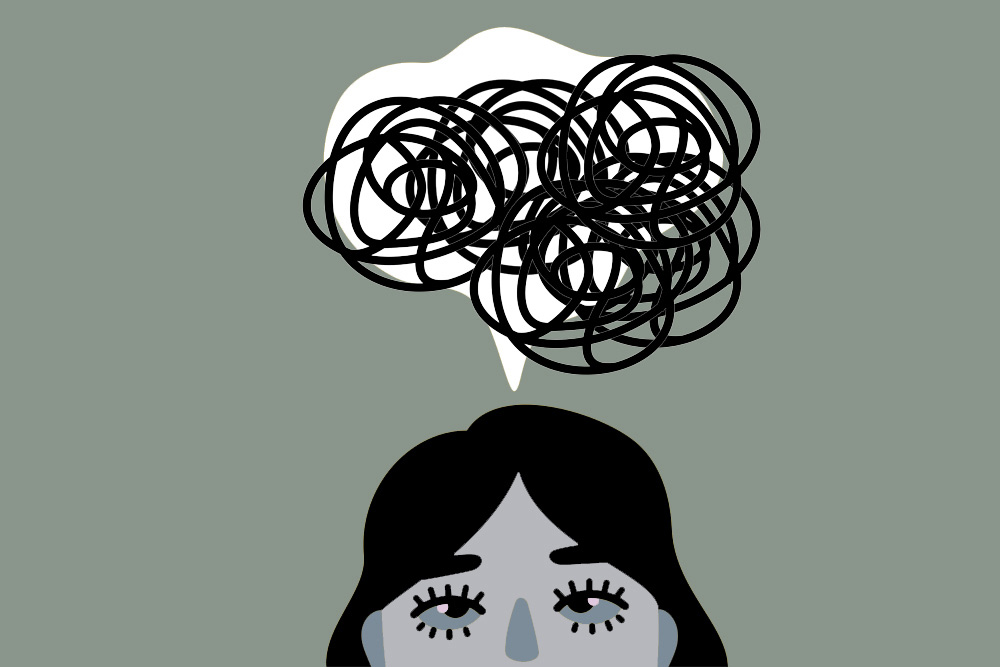Understanding Postpartum Anxiety

This disorder affects nearly as many birth parents as the more widely discussed postpartum depression. Understand the symptoms so you can get the help you need.
Expert Source: Susan Rannestad, LM, IBCLC
Content Warning: This article contains mentions of intrusive thoughts and suicide. If you’re struggling with thoughts of self-harm, the 988 Suicide & Crisis Lifeline can help.
Genevieve Ryczek, a mother of two in Minneapolis, experienced what she describes as a “birth high.” After a short but physically intense labor, she was elated with new motherhood and full of energy. While recovering in the hospital, she didn’t sleep a wink. She didn’t feel she needed to.
But by day three postpartum, Ryczek experienced a complete crash. Still sleepless, the feelings of energetic euphoria were suddenly replaced with exhaustion and agitation. This abrupt change quickly spiraled into full-blown panic.
“It hit me like a ton of bricks,” Ryczek says. “It was like nothing I’d ever experienced before. Everything felt strange and unreal. My husband seemed different. My house seemed different. I seemed different.”
Terrified, she went to the emergency room, but the chaotic environment only intensified the anxiety, as did the triage nurse’s persistent questioning about whether Ryczek felt she was a threat to herself or her new baby. Though dark and intrusive thoughts were not yet a part of the picture, they caught like wildfire with each well-meaning question.
She ended up leaving the hospital without a complete assessment, somehow managed to struggle through the night, and sought help from her psychotherapy health care professional the next day. Given the sudden severity of Ryczek’s condition, medication was recommended immediately.
Throughout pregnancy, Ryczek felt she had “done everything right.” With a history of anxiety, she dutifully went to preventative talk therapy. She practiced yoga and meditation. She ate a balanced diet. After all of the measures she took to prevent this outcome, the suggestion to medicate as a treatment option felt like a failure. The health she had worked so hard to maintain had slipped away somehow, and she worried about the implications and risk factors of taking psychotropic drugs. Would they be safe to take while breastfeeding? Would she be on them forever? Would they change her personality?
Now she was not only experiencing physical symptoms like shortness of breath, dizziness, and relentless worry associated with anxiety but doubt over treatment as well. The yoga, meditation, and years of therapy seemed lost on her the second she experienced these stressors and felt incapable of making a decision.
Misdiagnoses and Misunderstanding
One of the reasons Ryczek found this situation so frightening was that she genuinely had no frame of reference for this sudden onslaught of extreme anxiety. Although she had struggled with general anxiety and panic before becoming pregnant, she remained unaware of the specifics of the perinatal mood disorder called postpartum anxiety.
The general public now has a significant awareness of postpartum depression (PPD), but that awareness tends to be somewhat misguided and confused. Furthermore, other postpartum mood disturbances are rarely a part of the conversation. Add to that the media’s tendency to sensationalize extreme and violent cases of rare postpartum psychosis (occurring in approximately .1-.2% of births), and you have a murky picture of “what might happen” to a birth parent after delivery.
Birth parents often hesitate to mention symptoms of anxiety (irritability, disrupted sleep, heart palpitations, inability to relax, racing thoughts, difficulty focusing, forgetfulness, just to name a few) during the postpartum period because they have heard about only depression. They further hesitate because the dark thoughts that sometimes accompany postpartum anxiety bring about a fear of those extreme cases of postpartum psychosis. They fear being perceived as a bad parent, being labeled as unfit due to a mental illness, or that their baby will be taken away. And those fears spiral into panic.
When they finally find the courage to mention the symptoms, well-meaning friends or family will likely try to provide reassurance, saying, “You’re a new parent! Of course, you’re nervous!”
Further confusing the situation is the fact that this experience presents itself differently for each person. Though there are common characteristics, the anxiety can come on suddenly—as with Ryczek—or it can slowly build. A birth parent may develop obsessions and compulsions (postpartum OCD), or they may experience chronic panic attacks (postpartum panic disorder). Both fall under the umbrella of postpartum anxiety. Moreover, it is not uncommon to suffer from both postpartum anxiety and depression. The two conditions share the prevalence of several known symptoms and are—in a way—two sides of the same coin.
So we have this perfect storm: a birth parent unaware of postpartum anxiety as a real condition, a hesitation to seek help for fear of medication or accusation, the tendency to write off anxiety as new parent nerves, and a general inability to distinguish between postpartum anxiety, depression, and everything else on the spectrum, such as the baby blues.

Deciphering Between Anxiety and Depression
Susan Rannestad, LM, IBCLC, a midwife practicing in Pine Bush, New York, suggests that the common thread she sees amongst people suffering from postpartum anxiety is the inability to make decisions without guidance. “This birth parent always fears they are doing it wrong,” Rannestad says. It’s important to remember that the “classic” symptoms differ in each individual. For example, an obsession could be an intense and disturbing fear of kitchen knives, or a constant worry over the temperature of the room. Obsessions often lead to compulsions: hiding the knives, fussing with the thermostat repeatedly, or perhaps overusing hand sanitizer.
Some of these behaviors fall into the category of new-parent worry over their baby’s well-being, but the frequency and intensity will be higher with true postpartum anxiety.
Remember, some symptoms of postpartum anxiety are similar if not identical to those of postpartum depression, and the two mood disturbances can commingle within the same individual. It is important to seek counsel from a trained health care provider experienced in evaluating postpartum mood disorders specifically.
What the Numbers Say
Statistically, postpartum depression is still more common than postpartum anxiety. Postpartum Support International—an organization devoted to providing information, resources, and connection for birth parents dealing with perinatal mood disorders—estimates that 15% of new mothers will experience postpartum depression while 10% will experience postpartum anxiety. These numbers might be inaccurate, however. With postpartum depression often being used as a sort of blanket diagnosis for postbirth malaise, we might be underestimating incidents of postpartum anxiety. Of course, when birth parents don’t seek help or—even worse—fail to realize that they are struggling with a mood disorder to begin with, the number becomes further distorted.
In her smaller midwifery practice, Rannestad puts an emphasis on spending time getting to know each patient before and after birth. She believes the midwifery model’s approach to women’s health offers greater support for mental health and a tendency to screen for and catch possible perinatal mood disorders early on. While this can’t prevent mood disturbances from happening, she thinks it makes a positive difference.
Still, Rannestad has noticed a spike in anxiety issues. “This is climbing,” she says. Now, she sees it more than any other perinatal mood disorder, and in a way, it makes sense. New life, changed identity, increased responsibility, overwhelming love … bringing a baby into the world is a big deal for any parent. Hormonal highs and lows and exhaustion add intensity to an already heightened state of being. The situation is rife for mood disturbance.
The mounting pressure to have and do it all is also a contributing factor. Often, birth parents return to work while still recovering from the physicality of childbirth. They read every parenting book, do mommy-and-me yoga, run the PTA, and work a full-time job. They are always on, always available—by text, email, and social media. The standards have changed, and the “new normal” is taking a toll.
Of course, stay-at-home parents are in no way exempt from this sort of superhuman mentality. All new parents tend to bite off more than they can chew. On top of that, extended families are fractured—both literally and metaphorically at a greater distance, with 1 in 5 people saying they do not live near any extended family members, making seeking needed support more difficult but no less important.
How to Get Help for Postpartum Anxiety
For birth parents in the throes of postpartum anxiety, immediate treatment is a must. However, not every route to healing is recommended for everyone, and it is important to understand that relief comes in a different package for each individual, whether through talk therapy, support groups, sleep aids, caffeine elimination, spirituality, nutrition, exercise, or various medications. There are many paths to wellness, and a therapist specializing in perinatal issues can help figure out the right combination.
Beyond the acute treatment of the individual, our culture—as a whole—could benefit from greater awareness, compassion, and understanding. Knowing the signs and symptoms of postpartum anxiety can help a loved one get the treatment they need. Avoiding judgment and lending a hand can help make a dark day seem brighter. Most importantly, working—as a society—to lift the stigma from mental differences and treatment and educating parents-to-be about the full spectrum of mood disorders will help birth parents feel empowered to speak up and reach out.







